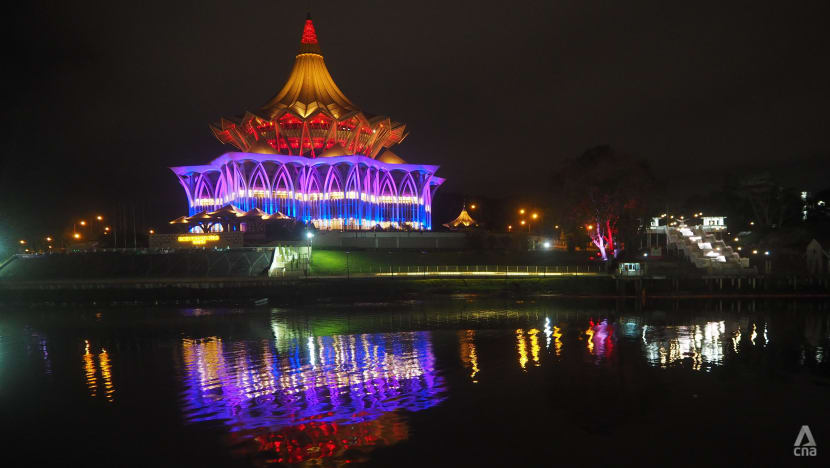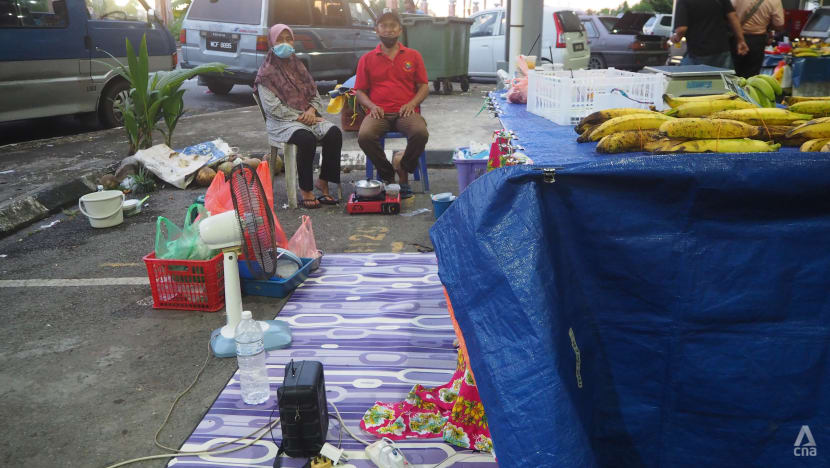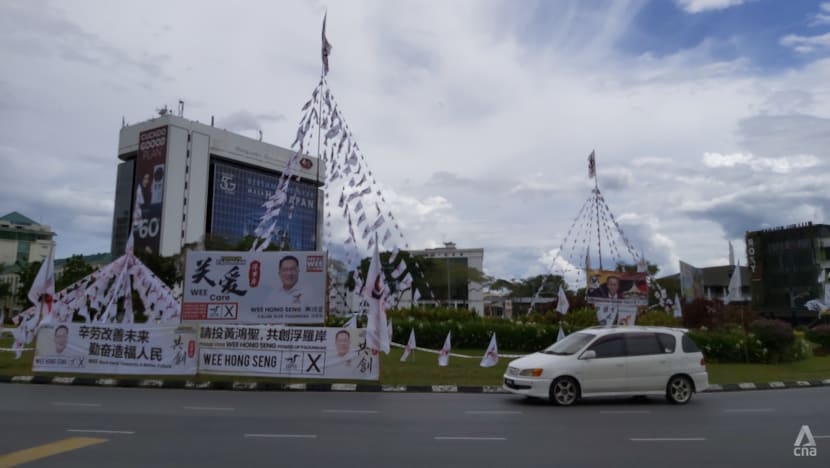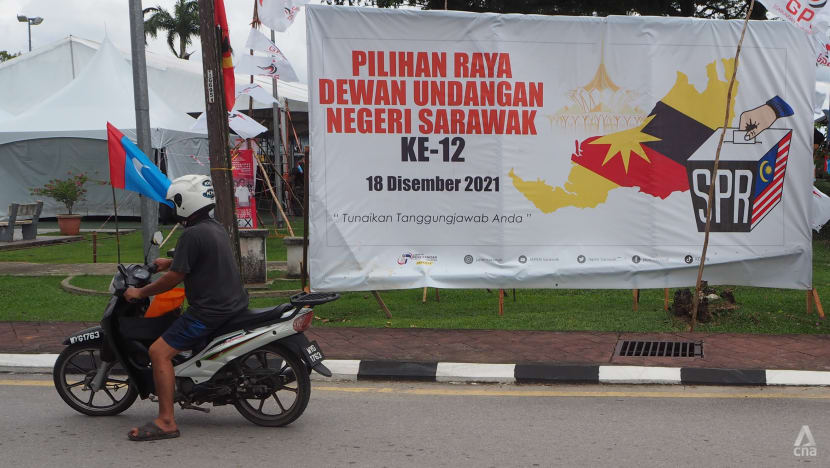For voters in Sarawak state polls, livelihood and basic infrastructure are their main concerns

The Sarawak State Legislature building situated next to the the Kuching River. (Photo: Rashvinjeet S Bedi/CNA)
KUCHING: As the sun set in Kuching, Sarawak, the Satok suspension bridge lit up in an array of neon colours.
There were a few people walking and running across the newly reconstructed 213m bridge that overlooks the Kuching River.
Located next to one end of the bridge was the Satok Weekend Market, where traders such as Raduan Yan and his wife, who only wished to be known as Ramlah, were selling agricultural produce such as bananas and papayas.
There were not many visitors around last weekend, compared to pre-COVID-19 times when the area would have been packed with people.
When the day ended, Mr Raduan and Ramlah - like some other traders there - would sleep on the tarred road next to his stall.
The couple, both 50 years old, only have a thin plastic mat as a mattress and a thin blanket. If it rains heavily, they would put up a huge umbrella next to them.
They do not have a house in Kuching. They work as farmers during the weekdays in their hometown Sebuyau, about 100km away, and travel to the state capital to trade at the weekend market.
In Kuching, they shower in public bathrooms and cook their meals on a portable stove.
“This is our life. We have no other choice to earn a living,” Mr Raduan told CNA.
With campaigning for the 12th Sarawak state election entering its second week before polling day this Saturday (Dec 18), some Sarawakians like Mr Raduan and Ramlah are not interested in some of the issues that the politicians have been peddling.
State rights, autonomy and the Malaysian Agreement 1963 are not their main concerns.
“Our only concern is survival. It would be good if the government can give people like us RM1,500 (US$354) a month,” said Ramlah.
“We hope that the politicians will still care to show up and meet the voters after they win,” she added.
Think-tank EMIR Research noted in a paper that Sarawakians appear to be more concerned about bread and butter issues such as cost of living, employment and income over who will form the next state government.
The political parties contesting in this state have pledged to eradicate poverty in the state and boost infrastructure development. Incumbent ruling coalition Gabungan Parti Sarawak, for instance, promised to elevate the quality of life and improve livelihoods of the people.
VOTERS WANT MORE ASSISTANCE FROM GOVERNMENT
Based on the 12th Malaysia Plan (12MP), Sarawak recorded 0.9 per cent per annum of gross domestic product growth between 2016 and 2020, the lowest compared with other states, EMIR Research said in its paper.
The economic performance of Sarawak during the past five years is lower than the national average of 2.7 per cent per annum and that the number of the bottom 40 per cent households in Sarawak had increased from 241,500 in 2016 to 250,200 in 2019, it noted.
Quoting figures from the Department of Statistics Malaysia, the think-tank said Sarawak’s unemployment rate increased from 3.1 per cent in 2019 to 4.3 per cent in 2020 and registered a -7.1 per cent gross domestic product growth in 2020.
“In a nutshell, political parties or candidates who prioritise restoring the economic livelihoods among Sarawakians would stand a higher chance to win the upcoming Sarawak state election and thereby govern the state,” it said.
Around 1.25 million voters are eligible to cast their votes to elect those vying for a seat in the 82-member state assembly.
A record 349 candidates are standing in the election, which has been delayed because of COVID-19.
This Sarawak election is the third state polls to be called in Malaysia amid the COVID-19 pandemic, which has caused loss of lives and livelihoods across the country.

Mr Raduan, the trader at the weekend market, said he hoped the government would extend more help to poor people like him.
“We do get help, but it is not enough. We don’t have much income and it is difficult to survive,” he said while showing CNA his dinner, which was a pot of rice to be eaten with condiments such as belacan (shrimp paste) stored in bottles.
He estimated that he and his wife earn about RM300 every weekend, half of what they used to earn before the pandemic struck.
The couple have five children; four are still schooling while the eldest is studying at a university in Johor.
A local resident of Kuching, who wanted to be known only as Ricky, said job opportunities were lacking, with fresh graduates even offered the minimum wage of RM1,200 in some jobs.
“It is not possible to survive on that alone. Youngsters have no choice but to go to Kuala Lumpur, Johor or Singapore so that we can earn a living and try to help our parents,” said the 22-year-old who was laid off from his job as a chef in the middle of this year.
He is planning on looking for a job in Kuala Lumpur soon, although he said the prospect of being away from home scares him.
UNEMPLOYMENT AND LACK OF BASIC INFRASTRUCTURE
A voter who is staying at a longhouse in Kampung Benuk, about 35km away from Kuching, was also concerned about bread and butter issues.
The 50-year-old man of Bidayuh ethnicity, who wanted to be known only as Boboi, lost his job in a hardware store in Kuching last year because of the pandemic and has been staying home ever since.
He works in the informal sector these days, toiling in farms and building homes, among other things.
He said his income depends on the jobs he gets, and that when COVID-19 cases were high, he had to stay home.
Boboi also lamented the bad Internet connectivity at several areas of his village, saying that the coverage was intermittent at times.
The Election Commission had said that 64 of the 82 seats in Sarawak had poor connectivity, and that physical campaigning was allowed in these constituencies while candidates in other seats were prohibited to hold public rallies.
“Will it make a difference?” Boboi said dryly when asked who he wanted as the next government.
He, however, said he would go out and vote come polling day.

Mr William Minggu, 70, an Iban voter from Kampung Sungai Alit in the Simunjan district said he is able to eke out a living but with much “difficulty”. The district is located about 90km from Kuching.
He said has land where he cultivates palm oil, but the problem is transporting the produce to Simunjan town.
There is no proper road connecting his village to the main town area, he told CNA when met at an event officiated by incumbent chief minister Abang Johari Tun Openg in Gedong, about an hour from Kuching.
There is a narrow 3km dirt road that can only be accessed by motorbikes during the dry season, he said.
As a result, the villagers must take a one-hour boat trip on the Batang Sadong River to transport the produce.
The village that consists of 26 families produces about 40 tonnes of oil palm a month, but they can only transport one-and-a-half tonnes of oil palm each trip via their boat.
They must wait for the opportune time for this – low tide on the way to the town and high tide on the way back.
“Sometimes we waste a whole day waiting,” said William, adding that he had been requesting for a better road for the past six years.

PARTIES’ PLEDGES
With Sarawak being one of the less-developed states in Malaysia, candidates on the campaign trail have promised to improve people’s livelihoods and hasten development.
At the launch of his alliance’s manifesto, Mr Abang Johari, the incumbent chief minister, pledged to make Sarawak a high-income state by 2030, reduce the income gap through more job opportunities and eradicate poverty in the state.
He said Gabungan Parti Sarawak (GPS) did not wait until election season to implement their initiatives and development projects.
He also said that they had implemented more than 100 “game-changing” initiatives to boost the socio-economic development of the state such as the Pan Borneo Highway that is scheduled to be completed by 2023 and the Autonomous Rapid Transit project in Kuching.
The coalition, which is contesting in all 82 seats in this state election, also promised a 100 per cent coverage of clean water and electricity by 2025 and 300 telecommunications towers by 2022 to improve Internet connectivity.
Parti Sarawak Bersatu, an opposition party contesting in 70 seats, has pledged to redirect financial resources to reduce poverty and improve the living standard of people in Sarawak with better housing as well as more employment and economic opportunities, among others.
They said that while the state was the third largest contributor to the country’s GDP, Sarawak had the third highest portion of people living below poverty levels and that 57 per cent of households were considered to be low income.
Democratic Action Party’s (DAP) Kelvin Yii, who is contesting in the Batu Kawah seat, said that in addition to infrastructure development, there was a need to empower local Sarawakians in order to face the post-COVID-19 challenges. DAP is standing in 26 seats.
He said that many people have lost their jobs and some lost family members and loved ones, while others face the daily struggle of putting food on the table.
“Sound policy interventions and measures should take centrestage in the form of social development targeted to the vulnerable across various aspects namely economy, health, social support and protection, opportunities and empowerment for youth and women, which the GPS has hugely neglected all this while,” he said in a statement on Dec 10.
BOOKMARK THIS: Our comprehensive coverage of the COVID-19 pandemic and its developments
Download our app or subscribe to our Telegram channel for the latest updates on the coronavirus pandemic: https://cna.asia/telegram

















